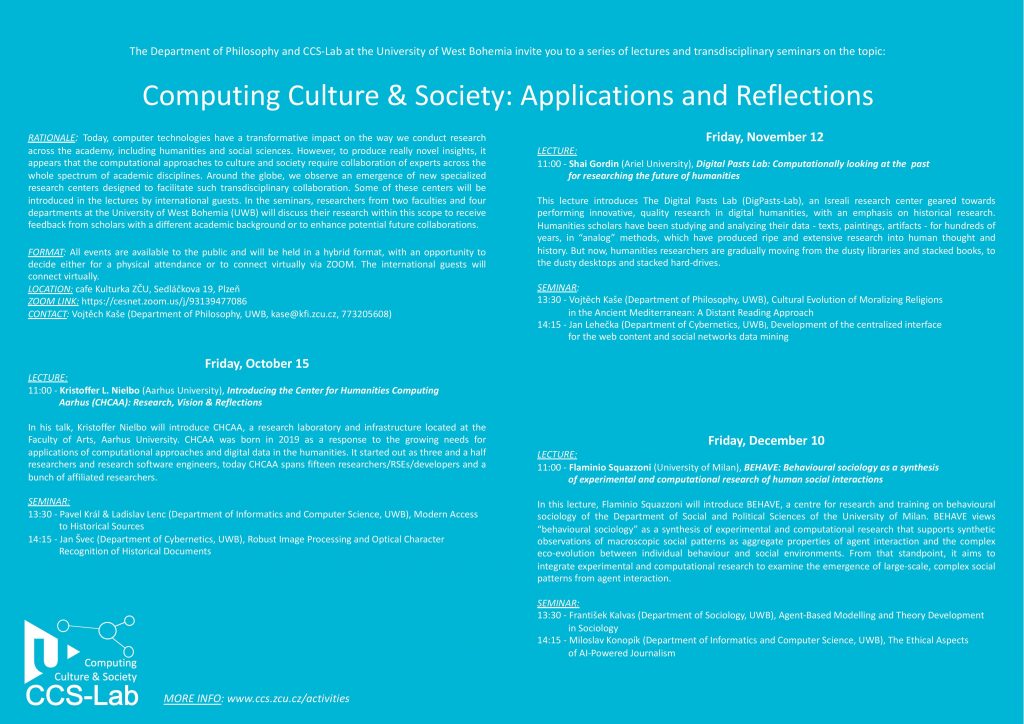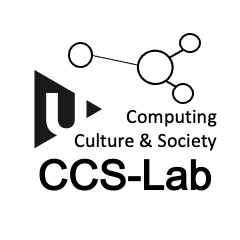The Department of Philosophy and CCS-Lab at the University of West Bohemia invite you to a series of lectures and transdisciplinary seminars on the topic:
Computing Culture & Society: Applications and Reflections
rationale: Today, computer technologies have a transformative impact on the way we conduct research across the academy, including humanities and social sciences (HaSS). However, to produce really novel insights, it appears that the computational approaches to culture and society require collaboration of experts across the whole spectrum of academic disciplines. Around the globe, we observe an emergence of new specialized research centers designed to facilitate such transdisciplinary collaboration. Some of these centers will be introduced in the lectures by international guests. In the seminars, researchers from two faculties and four departments at the University of West Bohemia (UWB) will discuss their research within this scope to receive feedback from scholars with a different academic background or to enhance potential future collaborations.
format: All events are available to the public and will be held in a hybrid format, with an opportunity to decide either for a physical attendance or to connect virtually via ZOOM. The international guests will connect virtually.
location: cafe Kulturka ZČU, Sedláčkova 19, Plzeň
zoom link: https://cesnet.zoom.us/j/93139477086
contact person: Vojtěch Kaše (Department of Philosophy, UWB, kase@kfi.zcu.cz, 773205608)
Friday, October 15
LECTURE:
11:00 – Kristoffer L. Nielbo (Aarhus University), Introducing the Center for Humanities Computing Aarhus (CHCAA): Research, Vision & Reflections (https://knielbo.github.io)
In his talk, Kristoffer Nielbo will introduce CHCAA, a research laboratory and infrastructure located at the Faculty of Arts, Aarhus University. CHCAA was born in 2019 as a response to the growing needs for applications of computational approaches and digital data in the humanities. It started out as three and a half researchers and research software engineers, today CHCAA spans fifteen researchers/RSEs/developers and a bunch of affiliated researchers.
SEMINAR:
3:30 – Pavel Král & Ladislav Lenc (Department of Computer Science and Engineering, UWB), Modern Access to Historical Sources
14:15 – Jan Švec (Department of Cybernetics, UWB), Robust Image Processing and Optical Character Recognition of Historical Documents
Friday, November 12
LECTURE:
11:00 – Shai Gordin (Ariel University), Digital Pasts Lab: Computationally looking at the past for researching the future of humanities (https://digitalpasts.github.io)
This lecture introduces The Digital Pasts Lab (DigPasts-Lab), an Isreali research center geared towards performing innovative, quality research in digital humanities, with an emphasis on historical research. Humanities scholars have been studying and analyzing their data – texts, paintings, artifacts – for hundreds of years, in “analog” methods, which have produkce ripe and extensive research into human thought and history. But now, humanities researchers are gradually moving from the dusty libraries and stacked books, to the dusty desktops and stacked hard-drives.
SEMINAR:
13:30 – Vojtěch Kaše (Department of Philosophy, UWB), Cultural Evolution of Moralizing Religions in the Ancient Mediterranean: A Distant Reading Approach
14:15 – Jan Lehečka (Department of Cybernetics, UWB), Development of the centralized interface for the web content and social networks data mining
Friday, December 10
(online only!)
LECTURE:
11:00 – Flaminio Squazzoni (University of Milan), BEHAVE: Behavioural sociology as a synthesis of experimental and computational research of human social interactions (http://behavelab.org)
In this lecture, Flaminio Squazzoni will introduce BEHAVE, a centre for research and training on behavioural sociology of the Department of Social and Political Sciences of the University of Milan. BEHAVE views “behavioural sociology” as a synthesis of experimental and computational research that supports synthetic observations of macroscopic social patterns as aggregate properties of agent interaction and the complex eco-evolution between individual behaviour and social environments. From that standpoint, it aims to integrate experimental and computational research to examine the emergence of large-scale, complex social patterns from agent interaction.
SEMINAR:
13:30 – František Kalvas (Department of Sociology, UWB), Agent-Based Modelling and Theory Development in Sociology
14:15 – Miloslav Konopík (Department of Computer Science and Engineering, UWB), The Ethical Aspects of AI-Powered Journalism

